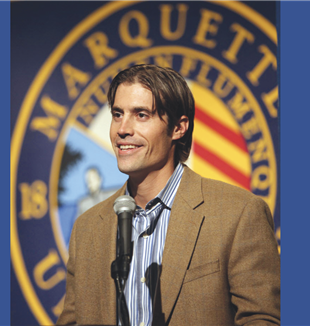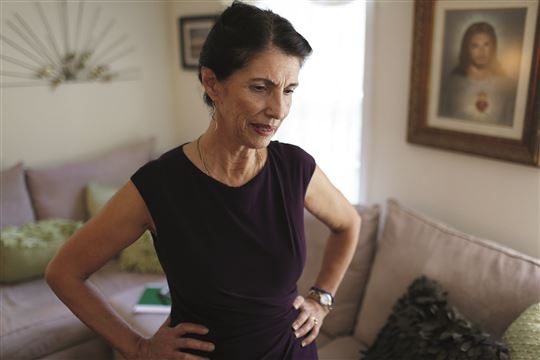
The forgiveness of a mother
Diane Foley lost a journalist son, kidnapped and beheaded by Isis in Syria. But resentment did not have the last word: "God teaches us mercy. We all need mercy.” She met his murderer, and convinced the U.S government to intervene in defense of hostages.“Prayer was the glue that enabled my freedom, an inner freedom first and later the miracle of being released during a war in which the regime had no real incentive to free us. It didn't make sense, but faith did." Jim Foley was an American freelance journalist who was kidnapped in Libya in 2011 and then freed. The following year he was in Syria where, again, he was seized by Isis forces. Two years later, the terrorist group released a video on YouTube titled "Message to America," which documents his beheading. The journalist's mother, Diane, made this statement, "We have never been prouder of our son Jim. He gave his life trying to expose the world to the suffering of the Syrian people. We implore the kidnappers to spare the lives of the remaining hostages. Like Jim, they are innocents. They have no control over American government policy in Iraq, Syria or anywhere in the world. We thank Jim for all the joy he gave us." We caught up with Diane Foley at the New York Encounter, where she recounted her journey of pain and forgiveness. An experience that led, through the Foundation dedicated to her son's memory, to getting the U.S. Administration to introduce a permanent figure to deal with hostages and support their families. This is an important phenomenon, as there are now 66 U.S. citizens who have been kidnapped or wrongfully detained outside their country. 
How did you not get overwhelmed by what happened to your son?
I think that God, in many ways, prepared me. Even as a child. My mother was Catholic, while my father belonged to the Unitarian Christian Church. She had a deep faith. My parents decided to let me choose which Church to be baptized into, and I chose the Catholic Church. I was attracted to it. I perceived a greater depth and authenticity. Then I had the fortune to get married and have five beautiful children. I worked as a nurse; I loved my job. Over the years, God nurtured and strengthened me for what was to come.
Who was Jim Foley to you?
He was our wonderful eldest son. And I do not think I ever realized how much he was. He was young, handsome. He became a journalist and was interested in the cultures of other parts of the world. He loved to delve into people's stories. He was a very good listener. He really had a gift for that. He was a very deep person. As a child he was an altar boy. Then, as he grew up, he moved away from the Church. But he was always searching. He was interested in the heart of man. In time, by studying philosophy and reading the Scriptures, he grew closer to the faith. But I found out later. His fellow prisoners told me: he used the calls of the Muslim prayer as a time of prayer. He would say the Rosary by counting with his fingers. I found out so much about him when he was gone. So many kids, so many young journalists told me how important he had been to them. He touched the hearts of many.
Did you know the risks Jim was facing with his work?
I had other sons in the military and, for me, they were the ones in danger. Instead, during Lent of 2011, he was kidnapped for the first time in Libya. And on that occasion, thanks to many people who helped us, he miraculously came home. That time there were witnesses to his abduction. In Syria, however, he disappeared into thin air, with no one having any idea where he was. We did not know if he was alive or not. It was a year before the kidnappers showed up. It was during those months that I decided to quit my job and devote myself full-time to my son's fate. And I found no help in Washington. I began to get some news when my fellow European prisoners were released: Jim was alive and well. I thought he might come home. But the United States refused to negotiate, as the European countries did. I trusted my country until the end. The Government assured me that Jim was their top priority. But that was not true. They killed him and the other American and British hostages.
How did you cope with what happened?
I do not know how I could have without faith. And because God was there from the beginning, right after Jim's death so many good people came forward. The two years of imprisonment were dominated by loneliness. But after my son was killed, so many people wanted to help us and took care of us. Even Pope Francis called us.
What is your memory of that dialogue?
It was very touching. On that day, the Pope had received news that a nephew, with his wife and children, had been in a car accident. Yet, in the midst of concerns for his family, he called us too. He said Jim is a martyr. He even called before our President. It was a great comfort. The Church and people of faith really supported us. God, through them, gave me a strength I did not think I had.
What has been the greatest difficulty?
Forgiving our government and learning to work with them to improve the way similar situations are handled. And trying to forgive those who had tortured and killed Jim. At first I was really angry. I had to pray a lot not to be imprisoned in anger and resentment. But God saves. Since I was a child, I had a sense of His presence in my life. And the more the years go by, the more this perception grows.
Why did you feel the need not to stay in the resentment?
Because it is terrible. There is nothing good in being dominated by that sense of anger. It is human to have those feelings. But God teaches us mercy. We all need mercy. We all need to be forgiven. And we need to trust God, because no one has an overview of what is going on. We need to recognize that we are His creation and we do not have an answer for everything. At least, I do not.
What did you gain in forgiving?
If I had stayed with my resentment, I would no longer have been able to provide joy. I would not have been able to see the beauty that God prepares before us. I would not have been able to realize the gift that is Jim.
You decided to go and meet Alexanda Kotey, one of the kidnappers.
It was a beautiful experience. Many people thought I was crazy. But I was convinced that Jim would have wanted me to do it: he would have gone to meet him and tried to listen to his story. There was a lovely woman working with the defense lawyers for restorative justice who made the proposal to me. The prosecution lawyers tried to discourage me. There was some tension, but in the end I am glad I went.
Why?
I have been to see him several times. But the second time was an especially grace filled experience. Compared to the other occasions, he was more quiet and relaxed, and I simply listened to him. He told me about his family and his three little daughters, whom he would never see again. He told me about why he became a jihadist and some of his experiences of pain. After these meetings he wrote me a letter of apology. I think it was a kind of healing for him.
What did you see in him?
I saw a person capable of compassion. It was hard to believe that he was the same person who had kidnapped and killed my son. Yet we all have different dimensions, we are all capable of doing good and evil. And this was very clear in him. When I heard him talk about what had prompted him to leave to join Isis, I thought of the young people Jim had met when, before he became a journalist, he had worked for Teach for America, the non-profit that asks top graduates from American campuses to teach in public schools in disadvantaged neighborhoods. I thought to myself, maybe he and Jim could have been friends.